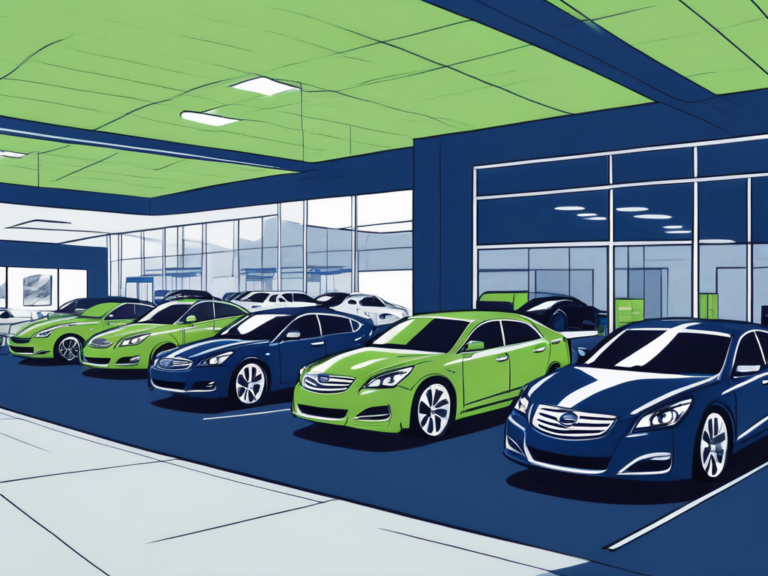Talk to Sales: (401) 200-6026

In today’s competitive automotive industry, it is essential for dealerships to have effective marketing strategies in place to drive more car sales. With the right marketing tactics, dealerships can reach a wider audience, increase brand awareness, and ultimately boost their sales. In this article, we will discuss 10 effective dealership marketing strategies that can help dealerships achieve these goals.
Understanding the Importance of Dealership Marketing
Dealership marketing plays a crucial role in the overall success of a dealership. It involves promoting and advertising the dealership’s products and services to attract potential customers. Effective marketing strategies can help dealerships stay ahead of the competition, build trust and credibility with their audience, and ultimately drive more car sales.
But what exactly does dealership marketing entail? It goes beyond simply putting up a few ads and hoping for the best. It requires a deep understanding of the target market, careful planning, and implementation of various marketing tactics.
One important aspect of dealership marketing is identifying the unique selling points of the dealership. What sets it apart from other dealerships in the area? Is it exceptional customer service, a wide selection of vehicles, or competitive pricing? By pinpointing these unique qualities, dealerships can create marketing messages that resonate with their target audience.
The Role of Marketing in Car Sales
Marketing plays a significant role in the car sales process. It helps dealerships reach potential customers and create awareness about their offerings. By employing targeted marketing strategies, dealerships can generate leads, nurture prospects, and ultimately convert them into paying customers.
One effective marketing tactic in the automotive industry is search engine optimization (SEO). By optimizing their website and content for relevant keywords, dealerships can increase their visibility in search engine results and attract organic traffic. This can be particularly beneficial for local dealerships, as customers often search for nearby options when looking to purchase a car.
Another crucial aspect of marketing in car sales is establishing a strong online presence. In today’s digital age, consumers turn to the internet for research and decision-making. Having a user-friendly website, active social media profiles, and positive online reviews can greatly influence a customer’s perception of a dealership and their likelihood of making a purchase.
Why Traditional Marketing Strategies May Not Be Enough
While traditional marketing strategies such as print advertisements, billboards, and TV commercials are still relevant, they may not be enough to maximize a dealership’s reach. In today’s digital age, consumers are increasingly turning to the internet and social media platforms for information. Dealerships need to adapt to these changing consumer behaviors and employ innovative marketing strategies to stay relevant.
One such strategy is content marketing. By creating informative and engaging content, such as blog posts, videos, and infographics, dealerships can establish themselves as industry experts and build trust with their audience. This can ultimately lead to increased brand loyalty and more car sales.
Additionally, targeted online advertising can help dealerships reach specific demographics and increase their chances of connecting with potential customers. Platforms like Google Ads and Facebook Ads allow dealerships to tailor their marketing messages to specific geographic locations, age groups, and interests, ensuring that their ads are seen by the right people at the right time.
In conclusion, dealership marketing is a multifaceted and ever-evolving field that requires constant adaptation and innovation. By understanding the importance of marketing in car sales and embracing new strategies, dealerships can position themselves for success in a competitive marketplace.
Sell cars on the lot faster with AutoRaptor
Know if we’re the right fit within 10 minutes
The Top 10 Dealership Marketing Strategies
Marketing is a crucial aspect of any dealership’s success. It is the key to attracting potential customers, building brand awareness, and ultimately driving sales. In this article, we will explore the top 10 dealership marketing strategies that can help your business thrive in the competitive automotive industry.
1. Utilizing Social Media Platforms
Social media platforms like Facebook, Instagram, and Twitter provide dealerships with an excellent opportunity to connect with their target audience. By creating engaging content, running targeted ads, and responding to customer inquiries, dealerships can establish a strong online presence and attract potential customers.
For example, a dealership can post high-quality photos and videos of their latest inventory, showcasing the features and benefits of each vehicle. They can also share customer testimonials and reviews to build trust and credibility. By actively engaging with their audience through comments and direct messages, dealerships can foster meaningful relationships with potential customers.
2. Implementing SEO for Your Dealership Website
Search engine optimization (SEO) is the process of optimizing a dealership’s website to improve its visibility in search engine results. By incorporating relevant keywords, optimizing metadata, and improving site speed, dealerships can drive more organic traffic to their website and increase their chances of converting visitors into customers.
Additionally, dealerships can create informative and valuable content, such as blog posts and buying guides, that align with the needs and interests of their target audience. By consistently producing high-quality content, dealerships can position themselves as industry experts and attract potential customers who are actively seeking information related to their products and services.
3. The Power of Email Marketing
Email marketing remains one of the most effective ways to engage with potential customers. By building a targeted email list and sending personalized, relevant content, dealerships can nurture leads, promote special offers, and build long-term relationships with their audience.
For instance, a dealership can send out regular newsletters that include updates on new vehicle models, exclusive promotions, and helpful tips for maintaining and caring for vehicles. By segmenting their email list based on customer preferences and behaviors, dealerships can ensure that their emails are tailored to the specific needs and interests of each recipient.
4. Leveraging Influencer Marketing
Influencer marketing involves partnering with influential individuals to promote a dealership’s products or services. By identifying reputable influencers in the automotive industry and collaborating with them on sponsored content or events, dealerships can reach a wider audience and build credibility.
For example, a dealership can collaborate with a popular automotive YouTuber or Instagram influencer to create engaging content featuring their vehicles. This can include test drives, reviews, and behind-the-scenes looks at the dealership. By leveraging the influencer’s existing audience and credibility, dealerships can increase brand awareness and attract potential customers who trust the influencer’s recommendations.
5. Hosting Community Events
Hosting community events is an excellent way for dealerships to connect with their local audience. By organizing car shows, charity events, or test-drive events, dealerships can create a positive brand image and foster a sense of community, ultimately attracting potential customers.
These events provide an opportunity for dealerships to showcase their latest models, offer test drives, and engage with attendees on a personal level. By creating a memorable experience for participants, dealerships can leave a lasting impression and increase the likelihood of converting them into customers.
6. Offering Customer Loyalty Programs
Customer loyalty programs are a great way to retain existing customers and encourage repeat business. By offering exclusive discounts, rewards, and VIP services to loyal customers, dealerships can build strong customer relationships and increase customer retention rates.
For instance, a dealership can offer a loyalty program where customers earn points for every purchase or service visit. These points can be redeemed for discounts on future purchases, free maintenance services, or even exclusive access to special events or promotions. By making customers feel valued and appreciated, dealerships can foster loyalty and turn customers into brand advocates.
Sell cars on the lot faster with AutoRaptor
Know if we’re the right fit within 10 minutes
7. Utilizing Data Analytics
Data analytics tools can provide dealerships with valuable insights into customer behavior, market trends, and campaign performance. By analyzing these data, dealerships can make informed decisions and optimize their marketing strategies to drive better results.
For example, by tracking website traffic and user engagement, dealerships can identify which marketing channels are driving the most qualified leads. They can also gain insights into customer preferences and behaviors, allowing them to tailor their marketing messages and offers accordingly. By continuously monitoring and analyzing data, dealerships can stay ahead of the competition and make data-driven marketing decisions.
8. Investing in Video Marketing
Video marketing is becoming increasingly popular in the automotive industry. By creating engaging and informative videos, dealerships can showcase their vehicles, share customer testimonials, and establish themselves as experts in the field. Video content is also highly shareable, allowing dealerships to reach a broader audience.
For instance, a dealership can create virtual tours of their showroom or produce educational videos that provide tips for car maintenance and care. They can also feature customer testimonials that highlight the positive experiences of previous buyers. By leveraging the power of video, dealerships can capture the attention of potential customers and convey their brand message in a compelling and memorable way.
9. Creating Engaging Content
Content marketing is about creating valuable, informative, and engaging content to attract and retain customers. By producing blog posts, videos, infographics, and social media content that educates and entertains their audience, dealerships can build trust, establish credibility, and increase brand loyalty.
Dealerships can create content that addresses common customer questions and concerns, provides car buying tips, or offers insights into the latest automotive trends. By consistently delivering valuable content, dealerships can position themselves as a trusted resource and go-to destination for all things related to cars and car ownership.
10. Implementing Mobile Marketing
With the increasing use of smartphones, mobile marketing has become crucial for dealerships. By optimizing their website for mobile devices, creating mobile-friendly advertisements, and utilizing SMS marketing, dealerships can effectively reach their target audience on their preferred mobile platforms.
For instance, dealerships can develop mobile apps that allow customers to browse inventory, schedule test drives, and receive exclusive mobile-only offers. They can also send out targeted SMS messages to notify customers about new arrivals, upcoming promotions, or service reminders. By embracing mobile marketing, dealerships can stay connected with their customers wherever they are and provide a seamless and convenient experience.
In conclusion, these top 10 dealership marketing strategies offer a comprehensive approach to reaching and engaging with potential customers. By utilizing social media, implementing SEO, leveraging influencers, hosting community events, offering customer loyalty programs, utilizing data analytics, investing in video marketing, creating engaging content, and implementing mobile marketing, dealerships can position themselves for success in today’s competitive automotive market.
How to Implement These Strategies Effectively
Understanding Your Target Audience
Before implementing any marketing strategy, it is essential to understand your target audience. Conduct market research, analyze customer data, and create buyer personas to gain insights into your customers’ preferences, behaviors, and pain points. This information will help you tailor your marketing strategies to reach and engage with your target audience effectively.
Setting Clear Marketing Goals
Clearly define your marketing goals and objectives. Whether it is increasing brand awareness, generating leads, or driving more car sales, having well-defined goals allows you to measure the success of your marketing efforts. Set specific, measurable, attainable, relevant, and time-bound (SMART) goals to keep your marketing strategies focused and effective.
Measuring Your Success
Regularly monitor and measure the performance of your marketing strategies. Use web analytics tools, social media insights, and customer feedback to track key metrics such as website traffic, conversion rates, engagement levels, and customer satisfaction. By analyzing these metrics, you can identify what is working well and make any necessary adjustments to optimize your marketing strategies.
Implementing effective dealership marketing strategies is crucial for driving more car sales in today’s competitive market. By understanding the importance of marketing, utilizing the top 10 marketing strategies discussed in this article, and implementing them effectively, dealerships can attract more potential customers, build strong customer relationships, and ultimately drive more car sales.
Subscribe to our Newsletter
Resources to help your dealership convert more leads into sales, retain more customers, and market inventory smarter, straight to your inbox every Sunday.




